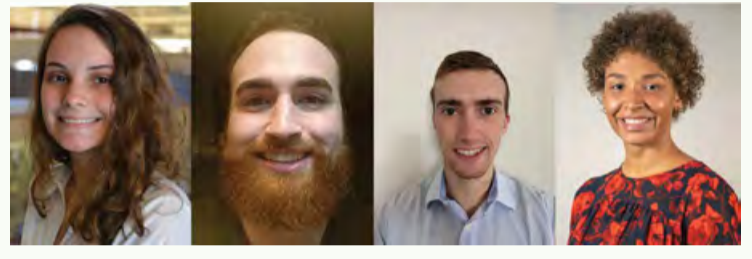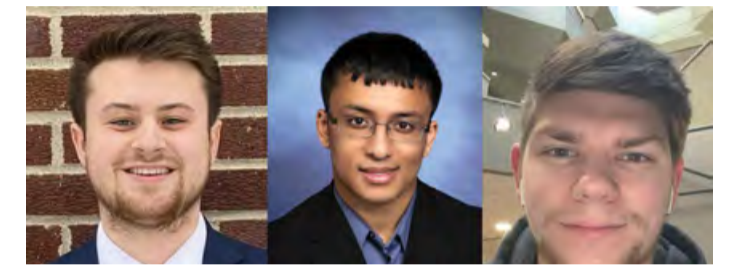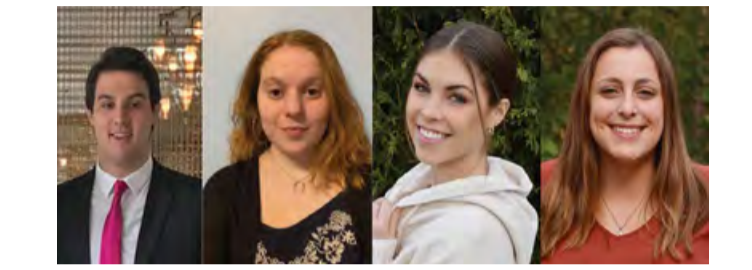Reduction of Anaerobic Conditions in an Industrial Wastewater Pumping Station
Design of a Small-Scale Food Waste Anaerobic Digester
Production of Methane via Carbon Dioxide
Designing a System to Create Renewable Natural Gas from the South Campus Anaerobic Digester
Weyerhauser Thermal Oil Filtration
Feasibility Study of Utilizing Hog Fuel for Onsite Heat Production
Portable Electrocoagulation Unit for Wastewater Treatment on Remote Army Bases
Lifecycle Assessment of PET with Multiple End-of-Life Scenarios for BIGGBY COFFEE
Cleaning Koppert’s Bee Bottles to Recycling Requirements
Shelf-Life Extension of Sweet Cider to Achieve Clean Label Status
Industrial Compressed Air Optimization and Automation to Achieve Energy Reduction
Improvement of a Potato Storage Ventilation System Using Modified Air Cup Design
Reduction of Anaerobic Conditions in an Industrial Wastewater Pumping Station
Team Name – Team Abbott Labs
Sponsor – Abbott Labs (project under Non-Disclosure Agreement)
Faculty Advisor – Dr. Steve Safferman, PE
Abbott Nutrition’s facility in Sturgis, Michigan pretreats industrial wastewater before discharging to the local municipal treatment plant. The pumping station for Abbott’s pretreatment plant has experienced anaerobic conditions, which lead to hydrogen sulfide production, resulting in additional costs associated with pH neutralization. Team Abbott Labs evaluated multiple opportunities to improve the system, including adding baffles to the wet well, modifying or replacing the outlet pumps, and using a reverse osmosis system to treat boiler feedwater. The team recommended adding baffles and pump extensions and installing a reverse osmosis system. The payback periods of these designs are under two years.
Design of a Small-Scale Food Waste Anaerobic Digester
Team Name – Team FireKeepers
Sponsor – FireKeepers Casino Hotel
Faculty Advisor – Dr. Yan “Susie” Liu
FireKeepers Casino Hotel in Battle Creek, Michigan wants to implement a small-scale anaerobic digester for their pre- and post-consumer food waste. The primary goal is to divert food waste away from landfill to beneficial reuse as feedstock for anaerobic digestion to generate energy and electricity. The team began by analyzing food samples from FireKeepers in order to size the digester. Then they developed a basic process flow diagram, approximated land requirements, and performed an economic analysis of the capital and operational costs, and maintenance costs and benefits.
Production of Methane via Carbon Dioxide
Team Name – Team Methanation
Sponsor – Consumers Energy (project under Non-Disclosure Agreement)
Faculty Advisor – Dr. Dana Kirk, PE
Due to the intermittent nature of renewable energy generation, a storage method for excess energy is necessary to balance supply and demand timing issues. Methanation provides a way to store excess energy as carbon-neutral gas. Methanation combines the use of waste carbon dioxide with hydrogen gas to form methane. Hydrogen gas is obtained from an alkaline electrolysis process and is powered with the energy generated from renewable energy. With the combination of these technologies, it is possible to store renewable energy.
Designing a System to Create Renewable Natural Gas from the South Campus Anaerobic Digester
Team Name – Team CMS – RNG
Sponsor – Consumers Energy (project under Non-Disclosure Agreement)
Faculty Advisor – Dr. Dana Kirk, PE
The team worked with Consumers Energy (CMS) to design a refinement facility utilizing the biogas produced from MSU’s South Campus Anaerobic Digester to produce renewable natural gas (RNG). This project aids the client in achieving net zero carbon emissions and meeting 90% of Michigan’s energy needs with clean resources by 2040. The design utilizes membrane permeation to bring biogas with a methane content of 65% to 97%. Following refinement, the RNG will be injected into CMS’ existing natural gas pipelines.
Weyerhaeuser Thermal Oil Filtration
Team Name – Weyerhaeuser Thermal Oil Team
Sponsor – Weyerhaeuser (project under Non-Disclosure Agreement)
Faculty Advisor – Dr. Ajit Srivastava, PE
Weyerhaeuser is a timberland company located in Grayling, Michigan. They use thermal oil to heat resins for their oriented strand board (OSB). Repeated bearing failure in the thermal oil pumps has required Weyerhaeuser to incur significant costs for bearing replacements. This reoccurring issue has caused our team to evaluate Weyerhaeuser’s oil quality, leading to a proposed solution of a kidney loop filtration unit to be attached to the system’s reservoir.
Feasibility Study of Utilizing Hog Fuel for Onsite Heat Production
Team Name – The Woody Wonders
Sponsor – Weyerhaeuser (project under Non-Disclosure Agreement)
Faculty Advisor – Dr. Dawn Reinhold
Weyerhaeuser is a multinational lumber company that manufactures oriented strand board (OSB) at their mill in Grayling, Michigan. The mill produces a large amount of hog fuel, a waste stream comprised mostly of chipped wet bark, as a byproduct. The Woody Wonders have been tasked with determining a suitable outlet for the hog fuel that is economically viable and environmentally friendly. After evaluating several biomass combustion technologies and offsite mulching opportunities, the team chose to implement an on-site fluidized bed boiler that burns the hog fuel for heating Weyerhaeuser’s thermal oil. This boiler was evaluated for feasibility.
Portable Electrocoagulation Unit for Wastewater Treatment on Remote Army Bases
Team Name – Team Clean Drinking
Sponsor – Department of Defense
Faculty Advisor – Dr. Wei Liao, PE
The Department of Defense (DOD) wants to employ a small-scale wastewater treatment system on remote U.S. Army bases. Team Clean Drinking designed an electrocoagulation unit, which is the initial step in wastewater treatment. This unit proceeds the ultrafiltration advanced membranes treatment to convert wastewater into water that meets the EPA treated wastewater discharging standard. The system needs to be portable within a skid and serve up to 150 soldiers. The system was designed to be set up quickly and operate in a wide range of climates with minimal labor.
Lifecycle Assessment of PET with Multiple End-of-Life Scenarios for BIGGBY COFFEE
Team Name – Just Brew It
Sponsor – BIGGBY® COFFEE (project under Non-Disclosure Agreement)
Faculty Advisor – Dr. Chris Saffron
The team worked with BIGGBY® COFFEE, a coffee company headquartered East Lansing, Michigan with franchises across the Midwest. Team Just Brew It worked to determine the ecological footprint of BIGGBY®’s cold cups composed of the plastic polyethylene terephthalate (PET), which will aid the company’s sustainability efforts. A lifecycle assessment was performed on four different end-of-life alternatives, including landfilling, physical recycling, chemical recycling, and combustion, to quantify the company’s ecological impact and determine the optimal disposal method.
Cleaning Koppert’s Bee Bottles to Recycling Requirements
Team Name – Bee-duce, Bee-use, Bee-cycle
Sponsor – Koppert Biological Systems, Inc.
Faculty Advisors – Dr. Dan Guyer & Mr. Phil Hill
Koppert, located in Howell, Michigan, raises bumblebees for commercial-scale pollination and is looking to reduce their environmental footprint. Koppert feeds their bees a sugar solution from high density polyethylene (HDPE) bottles. Due to the sticky nature of the sugar and bee residues, the bottles are not meeting the requirements of the local recycler. Through research and experimentation, a pressurized water system was developed. Based on experimentation, the process cleans 97% of the bottles with a single pass. After installation and final adjustments, 100% of Koppert’s bottles will be clean enough for recycling.
Shelf-Life Extension of Sweet Cider to Achieve Clean Label Status
Team Name – Blake’s Cider Fighters
Sponsor – Blake’s Hard Cider
Faculty Advisor – Dr. Ilce Medina Meza
Blake’s Hard Cider tasked Blake’s Cider Fighters with modifying the production of their sweet cider to extend the shelf life from 28 days to 45 days. To achieve a clean label, design solutions were constrained to meet natural label standards. The team considered diverse options for meeting Blake’s Hard Cider’s needs. The final project design included sourcing, preliminary implementation, and an economic analysis. This shelf-life extension allows the company to expand its supply chain and provide sweet cider to a wider array of customers.
Industrial Compressed Air Optimization and Automation to Achieve Energy Reduction
Team Name – Team Perrigo
Sponsor – Perrigo (project under Non-Disclosure Agreement)
Faculty Advisor – Dr. Pouyan Nejadhashemi
Perrigo is an over-the-counter pharmaceutical manufacturing company based in Allegan, Michigan. Each of Perrigo’s manufacturing plants uses compressed air for automation, quality control, and bottle orientation purposes. Compressed air can be inefficient because of its poor energy conversion, leakage, and continuous run time. Team Perrigo analyzed compressed air use in air knives for one production ‘ine at the Allegan facility. The team identified visible compressed air waste, collected data on compressed air usage, and developed system autonomy to reduce air consumption when the line was not operating. Future system autonomy suggestions were provided to enable further savings.
Improvement of a Potato Storage Ventilation System Using Modified Air Cup Design
Team Name – Team Techmark
Sponsor – Techmark, Inc.
Faculty Advisor – Dr. Wei Liao, PE
Techmark, Inc. is a multi-industry agricultural corporation based in Lansing, Michigan that specializes in root crop storage. Techmark, Inc. designs conditioned air handling systems at a specified velocity through a piled potato storage facility. Improper ventilation contributes to pressure bruising causing product (food waste) and revenue loss. The hypothetical cause is shearing forces at sharp-edged orifices at air cup inlets. The team performed a computational fluid dynamics (CFD) analysis of a single air duct with 28 air cups using 4 design alternatives. Design alternatives to the air cup inlet that increased air velocity and prevented pressure bruising were analyzed.












